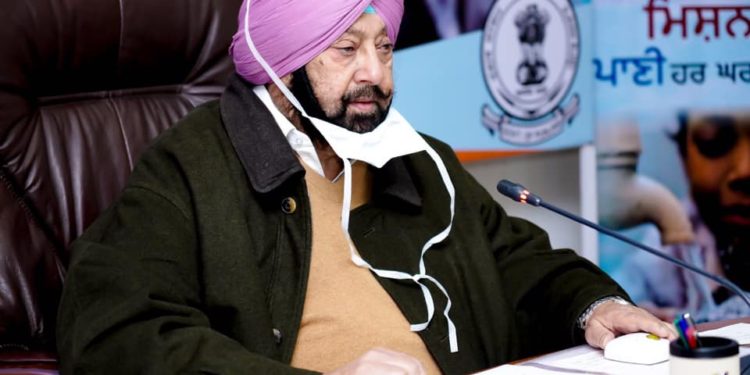Inaugurates slew of projects to provide clean & safe drinking water, address problem of arsenic affected supply
Chandigarh, February 1:
Chief Minister Captain Amarinder Singh on Monday virtually launched the
‘Har Ghar Pani, Har Ghar Safai’ mission as part of his government’s campaign to accomplish the goal of 100% potable piped water supply in all the rural households of the state by March next year, thus making Punjab the first state in the country to achieve this distinction.
Pressing the accelerator to execute the mission full throttle, the Chief Minister inaugurated one Mega Surface Water Supply Scheme, covering 85 villages in Moga district, 144 new water supply schemes for 172 villages, 121 Arsenic & Iron removal plants (35 inaugurated, along with 86 recently completed and dedicated to people). The scheme will benefit more than 1.6 lakh residents from 155 villages in Amritsar, Tarn Taran and Gurdaspur districts by helping replace groundwater with surface water supply for drinking, besides resolving the problem of arsenic affected habitations.
The scheme is being funded by World Bank, Jal Jeewan Mission of GoI, NABARD and State Budget
Terming safe drinking water as his government’s top priority, the Chief Minister said the incumbent Congress government had spent an average of Rs 920 crore annually on water supply and sanitation schemes, as against a mere Rs 219 crore expended by the previous SAD-BJP Government just spent Rs. 219 crore. A total of Rs. 1450 crore had been spent on rural sanitation and rural drinking water supply since taking over in March 2017, he said, noting that 99.5 percent of the rural habitations in Punjab today have access to piped water supply. Potable piped water is being supplied to 23.71 lakh rural households (67.65 % coverage), 6 lakh of which were added during the Covid pandemic, he said. He further pointed out that Punjab has already been declared Open Defecation Free in both rural and urban areas, with Rs. 863 crore having been spent on construction of 5.75 lakh individual rural toilets.
Several Sarpanches shared their experiences of the transformation of their villages as a result of these schemes. These included Sarpanch Balraj Singh of Khanpur Thiara, District Hoshiarpur; Sarpanch Kulwinder Kaur of Village Mehma Bhagwana, District Bathinda; and Sarpanch Pallavi Thakur of village Hara, District Pathankot.
Expressing concern over the 1634 quality affected habitations, the Chief Minister directed the Water Supply and Sanitation department to work in mission mode to replace ground water with surface water supply for drinking purposes wherever feasible, and address the problem of arsenic and other heavy metals affected habitations. He also launched a project to provide immediate relief to 54 villages of the border belt with high arsenic concentration in ground water (more than 50ppb) as an interim measure pending the supply of surface water supply to these areas. The Rs 4.85 crore project, to be completed by April 2021, will work on the nano-material based adsorption technology of IIT Madras.
On the occasion, Captain Amarinder also inaugurated a multi-village surface water supply project, covering 85 villages in the uranium affected blocks of Bagha Purana and Nihal Singh Wala, of Moga district, constructed at a cost of Rs. 218.56 Crore. This 50 MLD treatment plant would provide 24×7 potable water to 68839 households having a population of 3.64 lakhs.
The Chief Minister also formally launched the work on ground of 10 new large multi-village surface water supply schemes, at a cost of Rs.1020 Crore, covering 1018 villages in the water quality affected areas of districts Patiala, Fatehgarh Sahib, Gurdaspur, Amritsar and Tarn Taran.
Community based RO plants were also launched by the Chief Minister at a cost of Rs 9.7 crore in order to provide potable water in 106 fluoride affected villages in the State (Work on the project will be completed by March 2021). He laid the foundation stone of 75 rural water supply schemes which have been procured and allotted at a cost of Rs. 39.56 Crore, with work on them scheduled to start immediately for the benefit of 5.25 lakh residents of rural Punjab.
The Chief Minister also dedicated 68 recently commissioned rural water supply schemes constructed/ upgraded at a cost of Rs 29.74 Crore, while inaugurating another 76 water supply schemes constructed/upgraded at a cost of Rs. 42.06 Crore.
Captain Amarinder Singh laid the foundation stone of 1557 Community Sanitary Complexes for 1545 villages across the State. To sustain the Open Defecation Free status of the State, these Sanitary Complexes shall be built in the villages so as to cater to needs of migrant labour, visitors and poor households. The Sanitary Complexes shall be built, operated and maintained by the Gram Panchayats. An amount of Rs. 32.70 Crore has been disbursed to the Gram Panchayats to build these CSCs.
State Water Supply and Sanitation Minister Razia Sultana said that all the multi-village canal water based supply schemes are being allotted on a Design, Build, Operate and Transfer basis and the contractor shall be responsible for the operation and maintenance of these schemes for a period of 10 years. All these projects are likely to be completed by December 2022.
Among others present on the occasion included the President PPCC Sunil Jakhar, Chief Principal Secretary to CM Suresh Kumar, Chief Secretary Vini Mahajan, President Youth Congress Punjab Brinder Singh Dhillon, Sarpanch of Village Katli in district Ropar Kamal Singh and Sarpanch Kamlesh Rani of village Manko in district Jalandhar.








